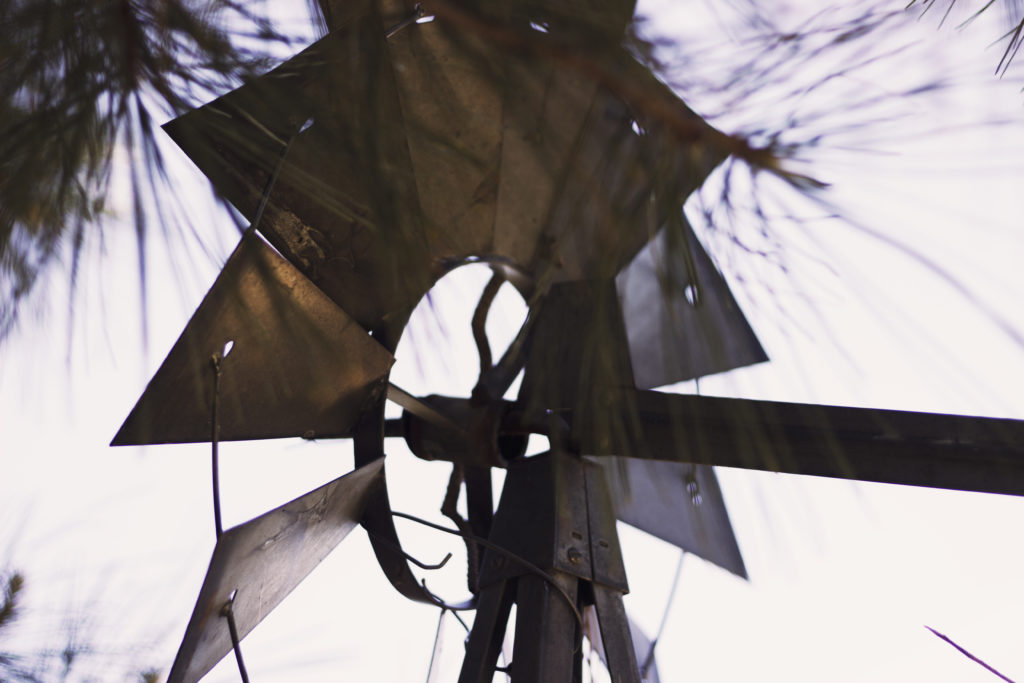How the Butcher Bird Finds Her Voice
From his knees Grandfather tied the legs of the sheep together. It kicked out a couple of times. The gray animal then stilled, breathing on its side in the dirt. Every time we killed a sheep, Grandfather showed us the same steps. Lifeblood is precious. Protect the heart.
“Pay attention,” he said.
Cindy picked up the large knife Grandfather brought from the kitchen.
“Put that down,” Grandfather said.
“It’s okay,” Grandmother contradicted.
Grandfather frowned. He swept his fingers up and down across the throat of the animal. He picked out goat-heads and burrs. He patted the wool clean.
“Shove that closer,” Grandfather said. He pointed to the large ceramic bowl at my feet.
I nudged it forward.
“Let her cut,” said Grandmother.
Grandfather squinted in the sunlight. “Okay, child, pull the blade across the throat here,” he said. His finger drew an unseen line just under the head of the sheep. “The skin will open quickly, but you need to cut deeper and deeper.”
Cindy stepped behind grandfather and kneeled onto the sheep, just like Grandfather showed us many times before. He held the bowl with both hands. It fit the shape where the curve of the neck joined the head.
Grandmother smiled. She didn’t see me looking at her, but her rare smile signaled things I didn’t understand and things I didn’t care to understand. Cindy saw the smile too and placed the blade at the animal’s neck. Grandmother spent more and more time with Cindy, and that was okay to be honest. It meant Cindy spent more and more time with all of us.
“Hold the head,” Grandfather said. He curled Cindy’s hand around the muzzle of the sheep. The lamb’s tongue pulled back between velvety gums, still free of any permanent incisors.
Cindy placed the blade to the throat of the animal again.
“Pull back on the head and pull your blade through.”
The first cut opened wide. A red spurt splashed into the white sides of the bowl. The animal’s eyes darted. It twitched with surprise. It always surprised me how quiet the taking of life could be. The simple sounds of being, our breathing our movement, drowned out birds and conversation and the other natural sounds of the afternoon.
Cindy pulled the knife across the flayed neck. More life flowed into the bowl. She cut again and again. Blood pumped fast and steady. It filled the bowl. The air smelled heavy, like rain.
Grandfather’s hands guided the bowl. He moved it just enough as the sheep tried to kick so as not to spill blood onto the ground.
Cindy cut deeper and deeper. I wasn’t sure how the head was still attached or how much more blood could possibly stream from the animal.
Then from one moment to the next the struggled ended. It shuddered to an end. Grandfather placed the bowl of blood to the side. Bright red gleamed around the edges, but the deep middle frothed thick and brown. Mud after a storm.
Cindy stood. Her hands stained red from slaughter. A single tear streaked down her cheek. It shone in the sun.
Cindy laughed.
“Good,” Grandmother said, “It is good to laugh. When we wash the stomach we should all giggle and laugh.”
I rolled my eyes at Cindy. She giggled some more.
Grandfather showed us how to roll the sheep on its back. He showed us where to cut the skin around the legs, up the belly. We spent some time, everyone with a knife, skinning, cutting and butchering the animal.
Grandmother put her hand on Cindy’s shoulder.
“You, girl, make an old woman proud,” she said, “today you found your voice.”
Cindy scratched dried, red flakes of blood from her wrists. The birds in the yard called back and forth from secret places. The sun cast down heat. Our faces and our arms and our necks radiated that heat into the glow of the afternoon. I helped grandfather clean up.
Grandmother and Cindy stood in the yard, heads bent toward each other, sharing more secrets, other secrets, ideas of this world or not of this world, ideas full of meaning and wonder, ideas both a part of and devoid of reality. They stood so closely together that their forms and the shadow they cast became indistinguishable. It was hard to tell where one person began and the other ended.
Again Cindy giggled. Her voice carried up, up into the sky and joined those free from the bonds that tie us to the ground. The clear sound of her laughter joined to my heart. Even without a knife she controlled that deep thumping drum inside my chest.
Markus Egeler Jones graduated with Eastern Kentucky University’s MFA. He teaches fiction at Lincoln University in Jefferson City, Missouri. His first novel is slated for a 2017 publication, and a smattering of short fiction and poems have been published by Crab Fat Magazine, The Story Shack, and The Windward Review among others.
